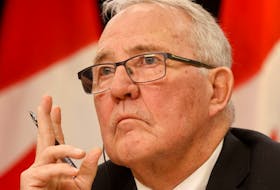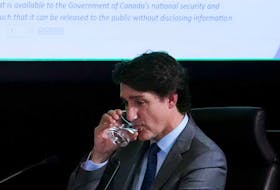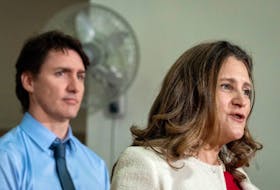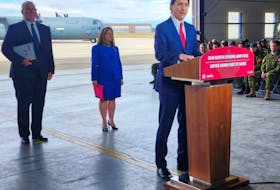The public service was not aware that WE faced financial problems when it recommended the charity receive a $900 million contribution agreement with Ottawa to promote student volunteerism, the country’s top bureaucrat told a parliamentary committee.
Yet the question that remains unanswered is: Did Justin Trudeau and Bill Morneau know about WE’s predicament?
Did they devise a program that only WE could deliver?
Ian Shugart, the Clerk of the Privy Council, was understandably busy in late April, coordinating the government’s response to COVID. As such, his knowledge of WE’s involvement with the Canada Student Services Grant program was sketchy.
At finance committee on Tuesday, he said no red flags were raised about WE’s ability to deliver a program that envisaged recruiting around 40,000 student volunteers (around one quarter of the number the government originally hoped for).
“There is not a precise process or established methodology,” he said about the due diligence the government employs. “Every situation is unique.”
Taxpayers might hope scrutiny at least extended to reading the agreement partner’s financial statements, particularly given the large amounts involved.
If public servants had taken a closer look at WE’s accounts, they would have discovered that on page 18, note 13 of the 2018 annual report, the charity had breached its bank covenants.
In addition, WE’s governance structure is labyrinthine, a tangle of non and for profit entities, with revenues flowing back and forth between the two in opaque fashion. WE’s entire board had either resigned or been replaced in the weeks before the agreement was made.
As Kate Bahen, managing director of Charity Intelligence, an independent charity watchdog, told the Canadaland news site, the bank covenant breach was a “massive, massive red flag.”
Shugart said the principle of using WE was logical. Third parties like the Red Cross and United Way had been used in the past to tap into expertise and contacts the bureaucracy did not have.
“The public service may be admirable but it’s not everything,” he said. “This is a standard means of doing business.” WE had partnerships with other charities and extensive social media reach with young people.
“WE was the only recommendation made, with the rationale that it was uniquely placed in our opinion,” he said. “There is absolutely no evidence, no suggestion that Trudeau interacted with WE about the agreement,” he said.
Shugart is an honourable man and there are no grounds to doubt any of his testimony. But by his own admission, there were a “vast range of issues at a very intense time” in late April, when he says he became broadly aware of the volunteer grant program.
There were long-standing links between WE and the Liberal Party, and the public service didn’t pull the charity’s name from thin air.
The Toronto Star reported on Tuesday that Bardish Chagger, the minister for diversity, inclusion and youth, had a meeting with WE’s co-founder, Craig Kielburger, on April 17 – a fact she neglected to mention when she appeared before the committee last Thursday. Her office says they did not discuss plans for the volunteer grant program and, rather, were focused on a social entrepreneurship idea WE had submitted on April 9. What we don’t know is whether Kielburger talked about WE’s finances to Chagger or anyone else in government.
This is the crux of the scandal, if there is one. Did the Trudeau government throw WE a financial lifeline by concocting the broad parameters of a program that only WE could deliver?
The answer to that question will likely be found in internal emails between political staff in the offices of Chagger, Morneau and Trudeau in the days before the Prime Minister made his announcement on April 22.
It absolutely will not be found in the House of Commons.
The House reconvened for a rare July sitting to pass legislation to extend the COVID-relief wage subsidy. Question period was an inglorious performance by the bacon’n’egg twins of Canadian politics – outgoing Conservative leader Andrew Scheer, fizzing and popping like rashers in a pan; Trudeau, looking like Humpty Dumpty, wishing he could put things back together again. His crestfallen caucus appeared to be regretting their decision to put all their eggs in one basket.
Trudeau said he would “consider” appearing before a parliamentary committee – an aptly condescending response for one who believes he exists in a special state of grace.
The prime minister preferred to talk about the government’s student relief package than the WE story, provoking the Conservative leader to synthetic outrage. “It’s gross and disgusting, using the pandemic as an excuse for his corruption,” Scheer said stiffly.
Much of the rest of question period was wasted by Conservative MPs asking various ministers if they agreed with Deputy Prime Minister Chrystia Freeland and continue to have “full confidence” in Trudeau.
The only moment of possible revelation was the response by the prime minister to a provocative taunt by NDP leader Jagmeet Singh, that the volunteer grants program was more about helping “wealthy friends” than helping students.
“It’s a shame to see such cynicism from the NDP,” said Trudeau.
Over the years, the Liberal leader has routinely implied his critics are guilty of cynicism. As often as not, his self-righteousness has been proven wrong and his critics culpable of nothing worse than realism.
If it is revealed that Trudeau did help out his wealthy friends, his eggs will be well and truly scrambled.
• Email: [email protected] | Twitter: IvisonJ
Copyright Postmedia Network Inc., 2020








